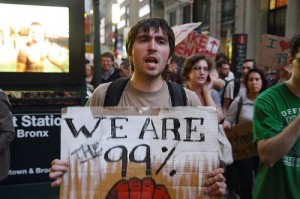 Occupy Wall Street. Well then.
Occupy Wall Street. Well then.
I’m hesitant to wade into these waters because of something my father — who was no stranger to a good Vietnam anti-war demonstration — used to always say: the only rational reason to go to a street protest is to meet girls. Period.
But, then again, he brought something of a liberal elitist’s narrow mindset to the term rational. Street protest certainly seems not only appropriate, but almost necessary for those shut out of the normal democratic process (i.e. African-Americans denied the right to vote; people under 21 who were being drafted pre-26th amendment; etc.). Not that any of that applies in this case. But as a libertarian, I’m willing to let a thousand flowers bloom; neither the means nor ends of others’ peaceful political activities need be rational in our own eyes. And the very practice of political activity, no matter how irrational or wacky, probably has some significant civil society benefits.
Three quick points:
1) Who are they and what do they want? That’s the $64k question that pretty much everyone and their brother is writing about today. For now, they are a movement with more inertia than specific ideas. Ezra Klein goes at it here. Nick Kristoff here. An interesting piece here. You can find suggestions for what they should demand here, and here. The ever-witty anarchist Who is IOZ? also chimes in, with expected comments.
One thing that struck me as I read the evidently-associated tumblr to the group is how much formal education they seem to have, and how important that is to their individual (and perhaps group) pysche. On the front page of the tumblr when I read it, twelve out of the fifteen essays mentioned their educational background in the first sentence or two.
In fact, a lot of angst in the essays struck me a bit on the elitist-entitled side. It has a lot of the traces of the old mugwump attitude. You “have an master’s degree from a top university” and you “can’t even get an interview”? Welcome to the real world.You’re “about to receive your PhD … from an Ivy League school” and there are “no jobs waiting for you?” How dare they! I certainly feel bad for anyone who is out of work, but I have a hard time thinking of these kinds of stories as bubbling up from a massive and increasingly-downtrodden underclass. It’s more reminiscent of the grousing I used to hear in graduate school.
2) Everyone wants to compare them to the Tea Party. From what I can see — and again I’m getting this exclusively from reading articles and examining related websites — they definitely share a certain conspiratorial populism. In fact, if you stripped away the aesthetics of each group, you might find a lot of core agreement among the two groups, especially as to who the boogeymen are: bankers, Wall Street, the federal government. You can sort of imagine coming up with a short, 300-word manifesto that both groups would be enthusiastic about, especially if you left the details vague enough.
On the other hand, Occupy Wall Street seems like the quintessential non-radical liberal social movement, almost to the point of self-parody. It’s completely amorphous and seemingly void of any thrust toward concrete political change. Those who are willing to consider themselves “spokespersons” seem to talk more about process than substance. There is constant reference to building a community, and a future time and place in which that community will have enough power that concrete change will come almost naturally. As usual: good luck, and I’ll believe it when I see it.
Maybe it’s too young or maybe it’s too early (existing liberal groups seemed to have finally taken notice and are starting to join forces), but my rule of thumb is that social movements without specific and clear goals tend to fizzle; they end up attracting every radical and his gripes, and becoming a circus platform for the same. If you think about the most successful and/or enduring social movements — the abolitionist movement; the prohibition movement; the 20th century civil rights movement; both sides of the abortion debate — they all had/have very specific concrete political goals.
This is not to say that Occupy Wall Street can’t channel it’s amorphous energy into political action — the Tea Party has been reasonably successful in going from street theater to concrete political influence — but it certainly feels like it has a long way to go.
3) This is exactly the kind of movement that liberals easily romanticize and conservatives easily dismiss. One thing I love about being a libertarian is that I tend to have lots of liberal friends and lots of conservative friends with whom I talk politics, which I think is somewhat rare. At any rate, I’m fully expecting to get the wide-eyed dreamer optimism about Occupy Wall Street from my liberal friends this week, and what I like to call the dirty-hippies-law-and-order speech from my conservative pals. Hell, I’ll be disappointed with anything less.
But I do think there’s some change in the air as far as street protest politics is concerned. My sense is that a lot of people subscribe to an old conventional wisdom that sees street protests as the province of liberals, something that conservatives just don’t do. And maybe’s that is historically true. But in the last generation or so, the picture has become much more muddled. The pro-life movement is probably the largest social movement in America, and the Tea Party has used street theater as an important tool in their political strategy. I doubt this will alter the frame through which liberals and conservatives consider Occupy Wall Street. But it’s something to think about.

Call me a bad liberal, but I think this movement is ridiculous. Fatuous, self-indulgent, and at times verging on the absurd. Nothing demonstrates that more than that silly tumblr page.